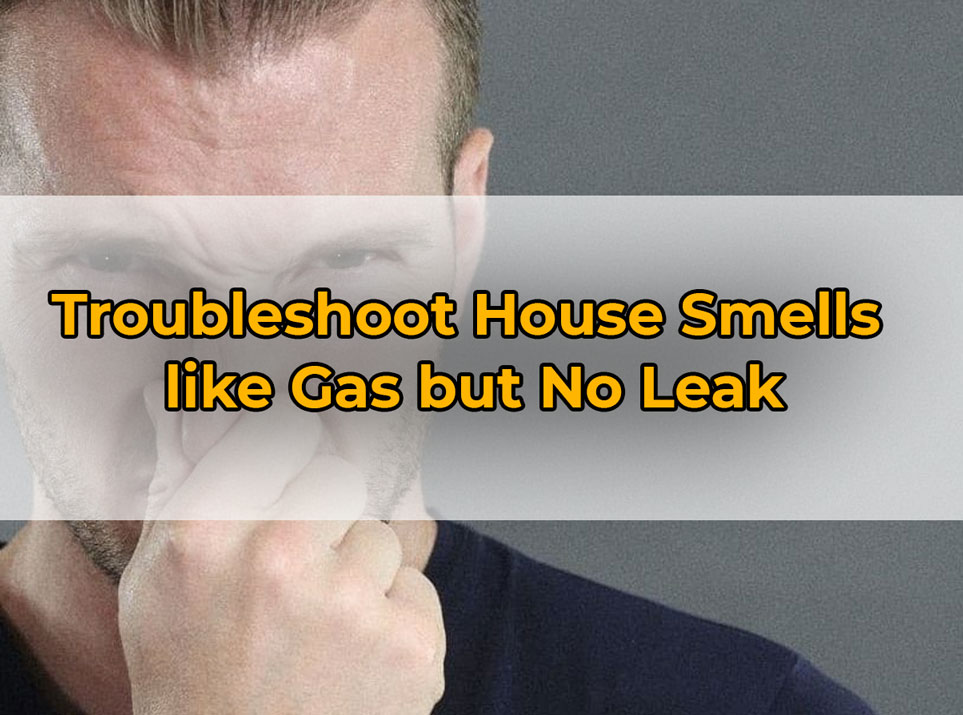Wondering why house smells like gas but no leak? The air in your house should always make you feel comfortable and safe. But if you smell gas but can’t find any leak, it’s confusing and worrying. Let’s look into this situation to find out what’s going on.
When you sense a strange gas odor in your home like unexplained sweet smell in house or burnt rubber smell in house, it’s important to take action straight away. Don’t ignore or dismiss the smell, as gas leaks are serious and could lead to fires or explosions.
Don’t ignore unusual gas-like odors. Install carbon monoxide detectors and regularly service your appliances to guarantee a safe and gas-free environment.
Take charge of your household safety. Address any house smells like gas but no leak promptly. It’s always better to be safe than sorry when it comes to gas leaks. Your family’s well-being depends on it!
Is It Dangerous if House Smells like Gas but no Leak?

Yes! The smell of gas in your house can be a cause for concern and should not be ignored. Gas leaks are potentially dangerous, as they can lead to fires or explosions.
The odor added to natural gas is actually a safety measure to alert you of its presence, as natural gas itself is odorless. If you detect the distinct smell of rotten eggs or sulfur in your home, it indicates that there may be a gas leak. It is crucial to take immediate action when you notice this smell.
Why House Smells like Gas but No Leak

The house smells like gas but no leak can be caused by several factors.
It is important to promptly address any potential gas leaks as they can be dangerous and pose a risk to the occupants of the house.
If a gas smell is detected, it is recommended to evacuate the premises and contact the gas company or a professional technician to inspect and address the issue.
1. Residual gas smell
One common culprit for this phenomenon is the presence of residual odors in the home’s HVAC system. Over time, gas appliances and heating systems can release small amounts of natural gas into the air, leaving behind a persistent odor even after the main source has been shut off. It can also happen because of oven smells like gas when preheating.
Additionally, if any recent repairs or maintenance work has been done on these systems, it is possible that some residual smells have lingered.
2. Pilot light issue
A pilot light is a small flame that continuously burns to ignite the burner in various gas-powered appliances such as water heaters, furnaces, and stoves.
When functioning properly, it remains concealed within the appliance. However, if there’s an issue with the pilot light, it can release a distinct odor of natural gas throughout your home.
One common reason for a gas smell without any visible leaks is a faulty or extinguished pilot light. If the flame goes out due to a draft or mechanical malfunction, the unburned natural gas will escape into your living space instead of being ignited at regular intervals.
The lingering scent may be particularly noticeable near appliances that use pilots lights or in areas where ventilation is poor.
3. Gas trapped in pipes or vents
One possible explanation for this unpleasant house smells like gas but no leak could be that gas has become trapped in the pipes or vents within your home’s plumbing system. Over time, small amounts of gas can accumulate in these confined spaces, resulting in an unsettling smell.
When gas gets trapped in pipes or vents, it may not necessarily indicate a dangerous situation but should still be addressed promptly. The accumulation of gas could occur due to various reasons such as improper ventilation, clogged vents, or even insufficient pressure within the plumbing system.
4. Sewer or plumbing issues
One possible culprit for house smells like gas but no leak could be a problem with the sewer system. The drain pipes in your home are designed to carry away waste and wastewater safely, but sometimes they develop issues.
A blocked or clogged sewer line can cause gases to build up and emanate unpleasant odors into your living space.
5. Other potential sources
It’s worth considering other potential sources of the odor, such as nearby industrial areas, chemical storage, or even environmental factors like nearby swamps or marshes. Sometimes, these external factors can create smells that resemble gas.
Safety Precautions
Safety Precautions are essential to ensure the well-being of individuals and their surroundings. Taking appropriate measures can help prevent potential hazards and promote a secure environment because of house smells like gas but no leak.
By following these safety precautions and remaining vigilant, you can minimize the probability of gas leaks and ensure the safety of yourself and your loved ones.
1. Ventilation
Ventilation comes in three types: natural, mechanical, and HVAC systems. Natural ventilation involves open windows or doors for fresh air circulation. Mechanical ventilation requires fans or exhausts to move air in and out of a space. HVAC systems use ducts and vents to regulate temperature, humidity, and air flow.
Plus, there are other factors affecting ventilation. Building layout, filtration, and regular maintenance all impact airflow. To further enhance ventilation, consider these suggestions:
- Open windows to let in fresh air.
- Place fans near windows or doors.
- Install exhaust fans in areas with moisture buildup or pollutants.
- Control humidity levels to reduce mold growth.
By following these tips, you’ll keep the air safe and healthy for everyone! And when turning off the gas supply, always do it slowly and carefully to avoid any explosive outcomes.
2. Turning Off Gas Supply
Turning off the gas supply is critical to safety. It prevents accidents and protects people and property. Here’s a 3-step guide:
- Find the gas meter. It’s usually outside by the home or building and looks like a metal box with a dial or display.
- Turn off the main valve. Use an adjustable wrench or pliers to rotate the valve clockwise until it stops. This shuts off the gas.
- Make sure it’s off. Check if any gas-powered appliances are still working or producing flames. If not, you’ve done it.
Only do this in an emergency or for necessary maintenance. For further safety:
- Have a professional inspection regularly.
- Install carbon monoxide detectors.
- Properly maintain appliances.
Follow these and you’ll keep your home safe while avoiding gas-related accidents and hazards.
Troubleshoot House Smells like Gas but No Leak

Steps to Troubleshoot a house smells like gas but no leak!
If you notice a gas odor in your house but there is no apparent leak, it is crucial to take immediate action to ensure your safety and prevent any potential hazards. Check also: Room Suddenly Smells like Garlic.
By following these steps, you can identify and address the issue of a house smells like gas but no leak, ensuring the well-being of yourself and your household.
1. Checking Gas Appliances
Gas appliance checks are an important piece of troubleshooting. It helps keep them running properly and avoid potential dangers. Here’s what to do:
- Check the gas supply – search for any leaks or harm in the gas supply lines. Make sure all connections and valves are secure.
- Analyze appliance components – look at every piece of the gas appliance, such as burners, igniters and regulators. Check for signs of deterioration, blockages or breakdowns.
- Clean the appliance – clear away all dirt and debris from the appliance. Be gentle and use a soft brush or fabric to clean the burners and other elements.
- Test for ignition – switch on the gas supply and try lighting the appliance. Ensure it starts up properly and has a steady flame without flickering.
Remember these safety procedures when checking gas appliances too:
- Turn off the gas supply before investigating or working on the appliance.
- Have a fire extinguisher close by in case of emergencies.
- If you suspect a leak, use soapy water to look for bubbles which show escaping gas.
Tip: To maintain efficiency and longevity, regularly check and clean your gas appliances.
Investigating a gas stove can be like a puzzle – you never know if it’s the burner, the igniter or simply the ghost of burned meals lingering in the kitchen!
2. Inspecting Gas Stove
Inspecting Gas Stove? Easy!
- Verify the gas supply to the stove is on and there are no leaks. Also, check for any damage or wear on the gas line.
- Examine burners and igniters closely. Clean out any clogs or debris. Make sure the igniters spark when the knobs are turned.
- Assess safety features too – gas shut-off valves and flame sensors. Test them per manufacturer’s instructions.
- Keep the area around the stove clean and free from flammable materials.
Want to get your gas water heater working? Tell it a shocking joke – it may just ignite out of embarrassment!
3. Checking Gas Water Heater
Time to inspect your gas water heater! Regular maintenance of this essential appliance is key for its proper functioning. Here are five steps to help you troubleshoot any issues:
- Check the pilot light. Is it on and burning steadily? If not, relight it using the manufacturer’s instructions.
- Inspect the gas line for leaks. Apply a soapy water solution to the connections. If bubbles form, it’s a sign of a leak and you should call a professional.
- Examine the thermostat settings. Make sure they’re set to your desired temperature. Adjust if needed using the manufacturer’s instructions.
- Inspect the flue pipe for any blockages or obstructions. Clear away any debris or build-up that may be restricting ventilation.
- Check the pressure relief valve. Lift the lever slightly and let some water flow out into a bucket. No water or water continuously flowing? You may need to replace the valve.
Follow these steps to troubleshoot issues with your gas water heater. Neglecting maintenance can lead to costly repairs or hazardous situations. Take action now to keep it running smoothly and safely for years to come!
4. Inspecting Gas Lines
To inspect your home’s gas supply, follow these three steps:
- Visually check for any signs of damage or leakage. Look out for corroded/worn parts, loose connections, and strange smells. If you spot any issues, take action quickly to avoid potential harm.
- Use a gas leak detector or soapy water solution to locate hidden leaks. Apply the solution gently along the gas lines and connections. If bubbles form, then a leak is present; you must call a professional right away.
- Assess the condition of the gas lines, ensure they are properly supported, and check for insulation and adequate clearance from other materials/appliances.
Safety comes first when inspecting gas lines. Have certified professionals do regular inspections to make sure everything is in good shape.
Regular inspections protect your property and your loved ones from potential accidents from house smells like gas but no leak.
5. Looking for Visible Leaks
Seeking Visible Leaks is the beginning move in diagnosing the house smells like gas but no leak issues. Here’s a 4-step guide to assist you:
- Analyze all visible pipes and connections for any signs of discharge.
- Explore for water stains or discoloration on walls, ceilings, or floors nearby plumbing fixtures.
- Scan under sinks and behind toilets for any dripping or pooling water.
- Use a flashlight to investigate hard-to-reach places such as crawl spaces or basements.
Aside from these steps, it’s essential to remember that leaks can also appear in unseen areas, like within walls or underground pipes. So, if you think a leak is present but can’t discover any visible marks, it might be required to get a specialist plumber for additional research.
6. Using Dish Soap Solution for Testing
Dish Soap Solution is a proven method to troubleshoot house smells like gas but no leak. Follow these 5 steps:
- Put soap and water in a spray bottle.
- Spray the solution on the problem area.
- Look for reactions.
- Clean the area with water and dry it.
- Check the outcome and decide if more action is needed.
Plus, this solution is cheap and accessible. Studies by The American Cleaning Institute say dish soap is great for cleaning and resolving issues like grease stains and bug problems.
And if troubleshooting is beyond you, call the pros – they won’t laugh at your tech jokes like I do.
When to Seek Professional Help
This house has killer vibes–gas leak or not! It’s essential to get professional help if your house smells like gas and there’s no visible leak. Gas leaks can be hazardous; causing serious health and safety risks. You must involve experts who are well-equipped to handle such situations.
Ignoring or neglecting this issue can lead to disasters. Fire, explosions, adverse health effects–the list goes on! Professionals have the knowledge and expertise to identify the source of the problem quickly.
Plus, they have access to specialized equipment that helps detect hidden gas leaks. And they possess the skills to safely repair any gas-related issues. Inspecting gas lines and appliances is essential for proper functioning and prevention of future incidents.
A homeowner once had a similar situation. Their house reeked of gas with no visible signs of leakage. They called professional help right away. The experts came equipped with advanced tools for detecting gas leaks.
It was discovered that a small crack in one of the gas pipes was causing the odor. The professionals quickly fixed the pipe, restoring safety and peace of mind. Without their help, this potentially dangerous situation could have escalated into a catastrophe.
Seeking professional help is key when you smell gas and there’s no apparent leak. Experts have the knowledge, equipment, and skills needed to handle such situations promptly and effectively. This ensures the safety of you and your loved ones.
Can a gas stove cause a gas smell even without a leak?
Yes, a gas stove can create a gas smell in your house without an actual leak. This can happen if the stove burner is not igniting properly or if the burner ports are clogged, leading to incomplete combustion. It’s important to ensure your gas stove is properly maintained and serviced regularly to prevent any potential issues.
How can I prevent a gas smell in my house?
Preventing a gas smell involves regular maintenance and being cautious with gas appliances. Schedule periodic check-ups for your gas stove, furnace, and water heater to ensure they are in good working condition. Additionally, promptly fix any malfunctioning appliances and install carbon monoxide detectors to provide an added layer of safety.
Why do I smell gas but no one else does?
If so, you may be experiencing a condition known as “phantosmia.” This rare disorder is characterized by the perception of smells that are not actually present. Phantosmia can be extremely distressing and disruptive to daily life, with the smell of gas being a common complaint among those affected.
The answer lies in the intricate workings of our olfactory system. Our sense of smell is regulated by special cells in the nasal cavity called olfactory receptors. These receptors send signals to the brain, which then interprets them as specific smells. However, in cases of phantosmia, these receptors may become overactive or misfire, leading to false sensations of odors like gas.
Can gas smell affect you?
Yes, Breathing in the odor of natural gas can cause several symptoms such as headaches, dizziness, nausea, and fatigue. These symptoms occur because natural gas contains chemicals like mercaptan, which give it that distinctive rotten egg smell.
The effects of inhaling gas odor can vary depending on the concentration and duration of exposure. In some cases, people may experience respiratory problems such as difficulty breathing or coughing.
Prolonged exposure to high levels of natural gas can even lead to more serious health issues like carbon monoxide poisoning or damage to the central nervous system. Therefore, it is important to take any smell of natural gas seriously and ensure proper ventilation in your home.
“There is no real ending. It’s just the place where you stop the story.”






